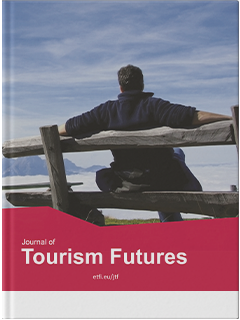Determining outcome factors of city branding post-COVID-19: roles of brand satisfaction, brand experience and perceived risk
IF 5.8
Q1 HOSPITALITY, LEISURE, SPORT & TOURISM
引用次数: 0
Abstract
PurposeThis study aims to investigate city branding as a post-pandemic COVID-19 outcome factor on brand satisfaction, brand experience, perceived risk and revisit intention. In addition, this research contributes to the discussion of post-COVID-19 city branding that needs to be considered in the development of future tourism marketing.Design/methodology/approachA quantitative approach was used with PLS-SEM statistical analysis and a 263-tourist sample. The study was conducted on tourists from Malang Regency in Indonesia by distributing questionnaires modified from previous studies in a similar context.FindingsThe results of this study found that there were significant influences of city brand personality on brand experience, brand satisfaction, brand experience on perceived risk, brand satisfaction on revisit intention and perceived risk on revisit intention. This study also presents the mediating role.Research limitations/implicationsThe study was only conducted on a small regency in Indonesia, and therefore the results cannot be generalized for other cities over the world.Practical implicationsThe proposed study model suggests that stakeholders must seek to socialize services to potential tourists, so that tourists can understand the description of tourism activities that can be enjoyed during the COVID-19 pandemic and the way they travel in the future.Social implicationsUnderstanding the determinant factors of city branding post-COVID-19 was valuable for developing marketing strategies to cope with intense competition among the city.Originality/valueThis study emphasizes the determinants of COVID-19 perceived risk and revisit intentions as explained in the tourism marketing literature by considering the role of brand satisfaction, brand experience and city brand personality which significantly contribute to build the city competitiveness. Therefore, various creative strategies should be implemented to promote the city as well as escalate tourist visits without ignoring the pandemic’s risks.新冠肺炎后城市品牌化的结果因素:品牌满意度、品牌体验和感知风险的作用
目的本研究旨在探讨城市品牌化对品牌满意度、品牌体验、感知风险和重访意愿的影响。此外,本研究还有助于探讨未来旅游营销发展中需要考虑的后新冠肺炎城市品牌问题。设计/方法/方法采用定量方法,采用PLS-SEM统计分析和263名游客样本。这项研究是在印度尼西亚玛琅摄政的游客中进行的,通过在类似背景下分发修改自先前研究的问卷。研究结果发现:城市品牌个性对品牌体验、品牌满意度、品牌体验对感知风险、品牌满意度对重访意愿、感知风险对重访意愿有显著影响。本研究也提出了中介作用。研究的局限性/意义:该研究仅在印度尼西亚的一个小摄政区进行,因此结果不能推广到世界其他城市。本文提出的研究模型建议,利益相关者必须寻求为潜在游客提供社会化服务,以便游客能够了解2019冠状病毒病大流行期间可以享受的旅游活动的描述以及他们未来的旅行方式。了解疫情后城市品牌塑造的决定因素,对于制定应对城市间激烈竞争的营销策略具有重要意义。原创性/价值本研究通过考虑品牌满意度、品牌体验和城市品牌个性对构建城市竞争力的重要作用,强调旅游营销文献中所解释的COVID-19感知风险和重访意愿的决定因素。因此,在不忽视疫情风险的情况下,应实施各种创意策略来推广城市,并增加游客访问量。
本文章由计算机程序翻译,如有差异,请以英文原文为准。
求助全文
约1分钟内获得全文
求助全文
来源期刊

Journal of Tourism Futures
HOSPITALITY, LEISURE, SPORT & TOURISM-
CiteScore
15.70
自引率
6.00%
发文量
64
审稿时长
34 weeks
期刊介绍:
 求助内容:
求助内容: 应助结果提醒方式:
应助结果提醒方式:


